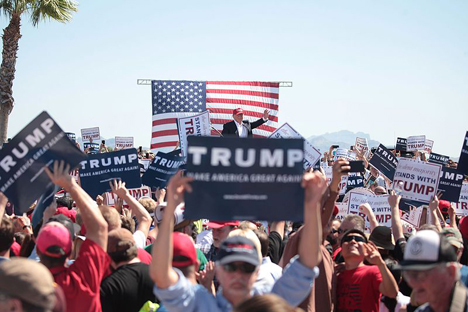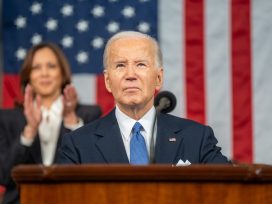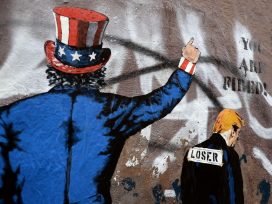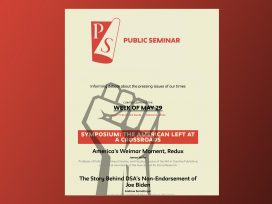Let’s see if a few blunt words can sort out some of the craziness before the presidential election takes place.
A sleazy, aggressive businessman decides that he knows how to run the country better than the moribund gang of politicians in control of his party – which is only nominally his party, because like any rich businessman he’s given money to all the parties. Except for a feeling that the US has made lousy trade deals, he doesn’t have much of a program, but he has a lot of media experience, and he thinks that saying whatever is on his mind no matter how outrageous will be more effective than the tired sloganeering of his competitors. Actually he doesn’t think anything. He runs on instinct and swagger, the meat and potatoes of much of American business.
His opponent is a plodding, relentless politician who through the years has become more militant and ambitious. She shares the usual liberal positions of her party, and her constituents want to like her – as well as feeling that it’s time that a woman was elected President – but she turns a lot of people off. It’s not clear why. There are some unsavoury aspects of her past, and she’s by nature evasive, more effective as a planner than a negotiator, but one could say that these flaws are shared by many politicians. Part of her problem is that she’s been around too long.
The campaign starts. The politician borrows some ideas from the Left, takes photo ops with magnates from the Right. Like any politician she tries to be everything to everyone, but nothing generates much enthusiasm. The businessman doesn’t respect the slyness of politicians or the fickleness of the media, and before long he gets hammered by both. The politician finds that her best tactic is to keep the focus on the businessman’s peccadilloes and let him bluster all he likes while she builds a coalition of niche groups. The occasional insights that the businessman has into the system are more than overshadowed by his unpleasant personality.
As the campaign gets grubbier, the public starts to tune out. The voters who feel disaffected – and this includes a fairly wide range of people – will vote for the businessman no matter what he says or how seamy his past, because his scattergun style reflects their frustration. The voters who are less pissed-off – who even think that things are going pretty well for them and their loved ones – declare for the politician because she supports the status quo, and they believe that she isn’t crazy, which they think the businessman is.
Many decide not to vote at all.
There’s another factor. Through no fault of his own – and this may come as a surprise to Europeans – the President has stirred up a lot of bad feelings. His personal reserve, his centrist caution, and the complexity of his historical position cause many to see him as aloof – to racists he is an “uppity nigger”, to American exceptionalists a “weak leader”. Whatever else he symbolizes, he represents change. The country isn’t white anymore. Live with it. The US may not be the guardian of the free world anymore. Live with that too.
In these last days before the election, the sides have been chosen, and now everyone wants to get it over with.
But both sides are scared. The Clinton camp is afraid of the chaos that will arise when Trump rounds up illegal immigrants, gets rid of industrial regulations, cancels trade agreements, keeps his finger poised over the nuclear button until he gets bored and turns over the government to even crazier lackeys. The Trump supporters fear that dark-skinned people will take away their jobs and the government will take away their guns, raise taxes, force them to enrol in socialistic health plans, and tie the hands of free market speculators.

Photo: Gage Skidmore; source Wikimedia
These fears are probably exaggerated. The businessman will probably try to do business – that is, make deals with everyone from Congress to Nato to Russia and China. The politician will try to do politics – put through some of her programs without stepping too heavily on anyone’s toes. The major plum will be the difficult task of appointing new justices to an ageing Supreme Court.
With an intractable Congress to contend with, nobody is likely to get much done.
So why is the world terrified? Because Trump’s demagogic tendencies reveal the fragility of the American democratic system, and how bankrupt it is in coming up with new ideas. Trump is frank about his defiance of the democratic process, and his determination to go it alone – “Nobody knows the system better than me, and I alone can fix it.” Yet Clinton has also been a divisive candidate, whose reputation for waffling, cosying up to wealth, and untrustworthiness has elicited bitter feelings, especially from the voters who were once the backbone of her party.
Whether the disaffected group represented by Trump – and the non-voters – add up to 40 per cent of the electorate or much more, the traditional democracies of the US and Europe have let them down. Their alienation is so complete that they’ll take any kind of change over the status quo. That’s why everyone is scared: this group is not going away, and democracy doesn’t know how to win them back.







